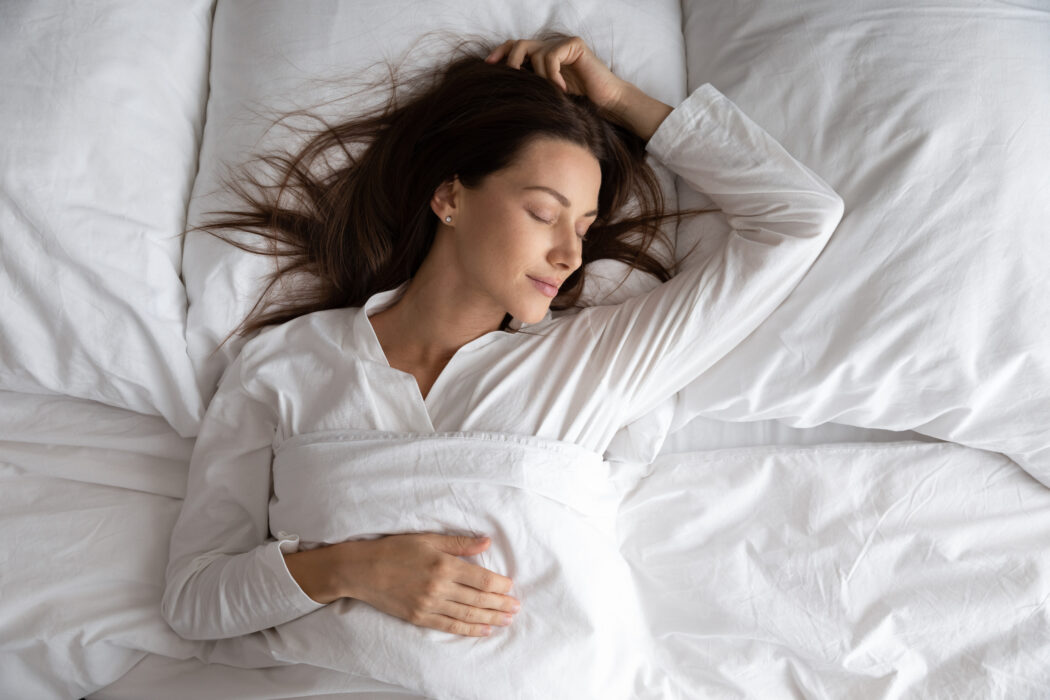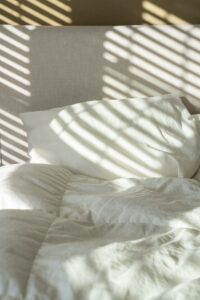Why we need our beauty sleep
Sleep is essential for healing the skin, with quality beauty sleep you will wake up looking fresh and radiant.
Beauty sleep is a must when you’re trying to look after your physical appearance including your skin. Not only is sleep important for energy levels, but it can work wonders in helping your skin appear more youthful and radiant. Sleep can also help with better skin hydration, skin wrinkling and fewer breakouts.

Sleep is a fundamental part of wellness, and it nourishes the mind, body and soul. In addition, it contributes to looking more youthful and can be a critical element of beauty.
During a good night’s sleep, your body removes toxic waste by-products that have accumulated throughout the day. Also, the body removes dead blood cells that can build up in the skin. If we don’t get enough quality sleep, we could notice skin imbalances such as dehydration, redness and wrinkles.
Specialists recommend that we should sleep seven to nine hours per night of good quality sleep. Here are a few tips and tricks you can try to achieve the deep sleep that your body craves each night. These simple beauty sleep tricks will leave your skin feeling fresh and glowing when you wake up. In addition, you will notice fewer wrinkles, a glowing complexion, brighter, less puffy eyes, healthier, fuller hair and your skincare products work better.
How to get quality beauty sleep
1. Use a silk pillow for your skin
Switching your cotton or linen pillowcase to a silk pillowcase can make all the difference to your skin! It has been proven that sleeping with a silk pillowcase can reduce breakouts, be anti-aging, reduce sleep creases, reduce fine lines and wrinkles. Sleeping with a silk pillowcase can also leave your hair feeling hydrated. Lilysilk is an Australian brand that sells inexpensive silk pillowcases that can combat sleep-related concerns.
2. Use a humidifier in your bedroom
Hydration is what keeps skin looking plump and fresh. But when we spend all night fast asleep, we aren’t hydrating by drinking water. As a result, your skin loses moisture and elasticity, which means it’s more likely to crack and have irritations and blemishes.
To help prevent skin dehydration, invest in a humidifier for your bedroom. Humidifiers work by taking water from a series of chambers and pushing it into the air, making that air less dry and, therefore, gentler on your skin. For the best hydration results, turn on the humidifier after you apply your nighttime serums and moisturisers.
3. Exercise regularly

Exercise is another healthy habit that will help you get the ultimate beauty sleep. There is a mountain of research that shows physical exercise improves sleep quality.
As you can tell, the link between physical activity and sleep is well-established. Moreover, decades of research show that getting plenty of exercise is “a healthy, safe, inexpensive, and simple means of improving sleep.”
4. Practise ways of having better dreams
Every night as we drift off to sleep, we enter the mysterious land of dreams. Psychologists explain that dreams are the processing of both our conscious and subconscious thoughts, but the phenomenon of dreaming is still somewhat unexplainable.
One thing is for sure when we have a night of pleasant dreams, it not only lifts our mood for the day ahead, but it also makes sleeping more enjoyable and relaxing.
Researchers found that participants introduced to sweet smells during the night were more likely to have positive dreams. When bad smells surrounded participants throughout the night, however, it helped to create nightmares. Essential oils have been proven to have healing qualities that can also be used to clear negative energies and restore peace.
5. Practise deep breathing
After a long, stressful day, you expect to fall asleep quickly. But often, a long stressful day can sometimes keep
your mind going, which in turn makes it very difficult to switch off – even when you’re exhausted. Enter the “4-7-8” method.
The “4-7-8” method is a breathing technique that slows down your thought process and relaxes your body which helps you get to sleep faster. This breathing technique slows your heart rate and allows your mind to focus on something other than what stressful events happened that day. But, unfortunately, it also increases the amount of oxygen in your bloodstream and releases harmful carbon dioxide that can be toxic to your skin.
Here’s how you do it:
- Place the tip of your tongue against the ridge of tissue just behind your upper front teeth and keep it there throughout the exercise.
- Exhale completely through your mouth, making a whooshing sound.
- Close your mouth and inhale quietly through your nose for a count of four.
- Hold your breath for a count of seven.
- Exhale completely through your mouth, making a whooshing sound for a count of eight.
- That’s one cycle. Repeat steps 2-5 three more times for a total of four cycles.
6. Keep the temperature low
At night, your body’s natural temperature declines. Therefore, keeping the temperature in your bedroom low is suitable for both your metabolism and your blood flow. This is important because improving your blood flow helps oxygenate your skin, keeping it plump and even-toned for the day ahead. Maintaining a cool temperature in your bedroom will also help reduce redness in your skin.
The National Sleep Foundation recommends keeping your bedroom between 60 and 67 degrees for an optimal night’s sleep. “Why so cold?” you may ask. Because researchers believe this range best allows your body to redirect energy that would typically be used for maintaining temperature into other repair and rejuvenation functions.
7. Turn off electronics one hour before bed

Electronics such as tablets, laptops, smartphones, TV, and even some light bulbs (e.g. LED) emit blue light, which delays the release of melatonin and can keep you awake long into the night.
Replace bedroom light bulbs (such as LED and other energy-efficient designs) with bulbs that emit a more natural white light. This will help your brain prepare to release melatonin, which enables you to get restful beauty sleep.
8. Try stress-reduction techniques
Stress and sleep are deeply intertwined. Studies have shown that high levels of stress can disrupt sleep. At the same time, a lack of sleep can cause stress.
Here are some techniques for reducing stress before you hit the hay:
- Practice simple yoga poses
- Meditate
- Try deep breathing exercises (see tip number six)
- Massage your temples, forehead, and neck
- Clear your mind of negative thoughts
Here are suggestions for other activities you can include in your bedtime routine:
- Read a book or magazine in bed
- Meditate or do some yoga to wind down
- Use aromatherapy candles in the bedroom to wind down
- Keep a journal or diary and write about your day
- Listen to soft music
- Take a warm shower or bath




